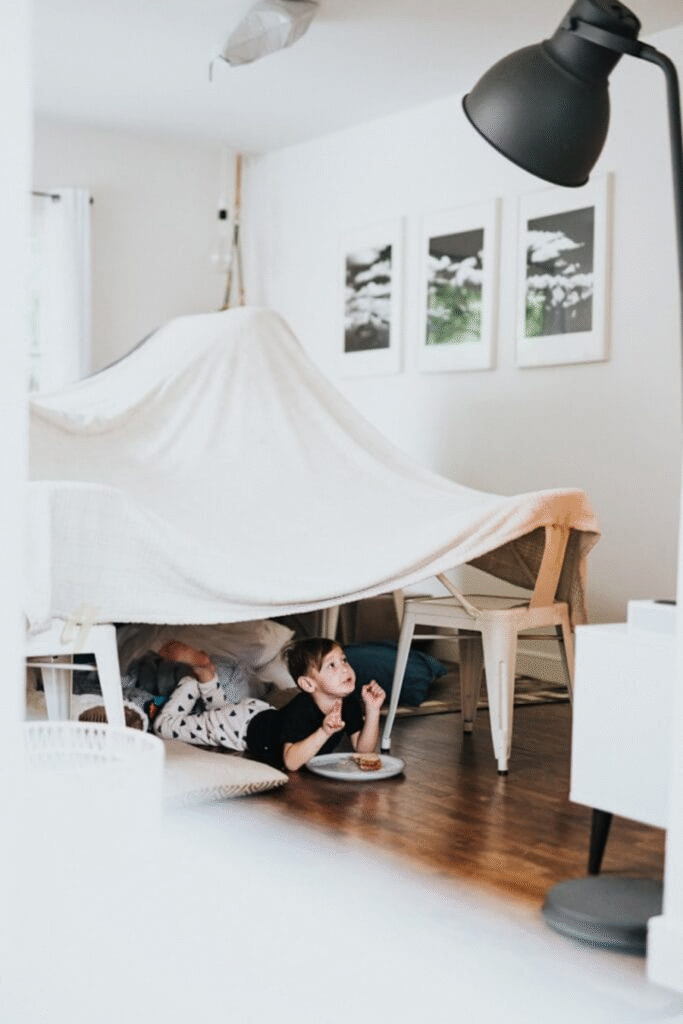Transform Your Life: Embracing Life’s Detours for Ultimate Joy and Growth

Embracing life’s detours has completely transformed how I view unexpected challenges and spontaneous opportunities. Life has a funny way of laughing at our carefully constructed plans, but after six kids and countless curveballs, I’ve discovered that some of life’s greatest treasures hide in those unplanned moments we initially resist.
The truth is, our best stories rarely come from the things that went exactly as planned. They come from the detours, the surprises, and the moments when we threw our hands up and decided to see where the road would take us instead. Embracing life’s detours isn’t just about adventure—it’s about personal growth, family bonding, and discovering resilience you never knew you had.
The Psychology Behind Why We Fear Unplanned Adventures
🧠 Our brains are wired to seek predictability and control. From an evolutionary standpoint, this makes perfect sense—our ancestors survived by anticipating threats and planning ahead. But in our modern world, this same instinct can keep us trapped in comfortable routines that, while safe, might not lead to growth or fulfillment.
Research from the National Institute of Mental Health shows that people who regularly engage in spontaneous activities report higher levels of life satisfaction and creativity. When we step outside our comfort zones and embrace life’s detours, we’re literally rewiring our brains for resilience and adaptability.
The fear of the unknown isn’t a character flaw—it’s human nature. But recognizing this fear gives us the power to work with it rather than against it. Instead of viewing uncertainty as a threat, we can reframe it as an opportunity for discovery. This mindset shift is crucial for building confidence in our ability to handle whatever comes our way.
Embracing life’s detours requires us to challenge our need for constant control and certainty. The more we practice stepping into uncertainty with curiosity rather than fear, the more comfortable we become with life’s inevitable surprises.
When Our “Perfect” Family Vacation Became Perfectly Imperfect
✈️ Three summers ago, we had planned what I thought would be the ultimate family vacation to Disney World. Everything was booked, itineraries were printed, and the kids were counting down the days. Then Hurricane Ida decided to crash our party, grounding flights and forcing us to cancel our carefully orchestrated trip.
My initial reaction was pure frustration. All that planning, all that money, all those excited kids—wasted. But my wife looked at me and said something that changed everything: “What if we just see where the road takes us?”
We loaded up our van with camping gear and started driving. No reservations, no itinerary, just a general direction and an open mind. That “ruined” vacation turned into two weeks of discovering hidden waterfalls, meeting fascinating people at roadside diners, and having the kind of deep family conversations that only happen when you’re not rushing to the next scheduled activity.
The kids still talk about that trip more than any other vacation we’ve taken. It taught all of us that embracing life’s detours doesn’t mean settling for second best—it means opening yourself up to possibilities you never would have considered otherwise. Sometimes the most meaningful family experiences come from the moments when everything goes wrong but you choose to make it right together.
Just like the insights I shared about positive mindset habits that transform daily life, embracing life’s detours requires a fundamental shift in how we view unexpected situations.
The Art of Saying Yes to Spontaneous Opportunities
💡 One of the biggest barriers to embracing life’s detours is our default response to unexpected opportunities: “No, thanks. That wasn’t in the plan.” But what if we flipped that script and started saying yes more often?
I’m not talking about reckless abandon or saying yes to everything that comes your way. I’m talking about cultivating a mindset that’s open to possibilities, especially when they align with your values and could lead to growth or connection.
Here are some simple ways to practice saying yes:
- Accept last-minute social invitations even if you had planned to stay home
- Try that new restaurant your friend recommended instead of going to your usual spot
- Take the scenic route home from work occasionally
- Say yes when your kids suggest building a fort in the living room
- Join a friend for an impromptu adventure or activity
Each small yes builds your comfort level with spontaneity and makes it easier to recognize and embrace bigger opportunities when they arise. The practice of saying yes to small, low-risk adventures prepares us for those bigger moments when embracing life’s detours could lead to significant positive changes.
According to research published by the Psychology Today, novel experiences stimulate neuroplasticity, helping our brains stay flexible and adaptable throughout our lives.
Parenting Through Unexpected Moments and Building Resilience

👨👩👧👦 If there’s one thing that six kids have taught me, it’s that parenting is the ultimate exercise in embracing life’s detours. You can read every parenting book, follow every expert’s advice, and have contingency plans for your contingency plans—and your kids will still find ways to surprise you daily.
Some of my favorite parenting moments have come from those unscripted times when our carefully laid plans went sideways. Like the time we were running late for church and found our youngest had “decorated” herself and her room with an entire tube of diaper cream. Instead of losing my mind, we took pictures, gave her a bath, and arrived at church an hour late with a story that still makes us laugh.
Or the evening when a thunderstorm knocked out our power right during dinner prep. Instead of scrambling to find backup plans, we made sandwiches by flashlight and had an impromptu camping experience in our living room. The kids declared it the best dinner ever.
These moments remind me that perfection is overrated. The goal isn’t to control every variable—it’s to stay flexible enough to find joy and connection even when things don’t go according to plan. Embracing life’s detours as a parent teaches our children that adaptability and resilience are more valuable than rigid adherence to plans.
When we model flexibility and curiosity in the face of unexpected situations, we’re teaching our kids life skills that will serve them far better than any perfectly executed schedule ever could. Much like the strategies I discussed for conquering debilitating headaches, dealing with parenting surprises requires practical approaches and mental fortitude.
Career Detours That Led to Unexpected Fulfillment
💼 My career path has been anything but linear. After years in structured military environments, I found myself thrust into the unpredictable world of entrepreneurship and content creation. This wasn’t part of my original plan, but embracing life’s detours in my professional life has led to more fulfillment than I ever experienced following a traditional career trajectory.
The key insight I’ve gained is that career detours aren’t failures—they’re course corrections. Sometimes you need to get “lost” to find where you actually belong. The skills, experiences, and relationships you build during unexpected professional seasons often become the foundation for future opportunities you never could have planned.
Signs a career detour might be beneficial:
- You feel consistently unfulfilled in your current role despite success
- You have interests or skills that aren’t being utilized in your current position
- You find yourself constantly fantasizing about different career paths
- Unexpected opportunities keep presenting themselves, but you keep dismissing them
- Your personal values no longer align with your work environment
- You’re curious about industries or roles completely different from your current field
The courage to take professional detours often comes from recognizing that the greatest risk isn’t changing direction—it’s staying on a path that no longer serves you or your family’s best interests. Embracing life’s detours professionally has taught me that security doesn’t come from staying in one place—it comes from building confidence in your ability to adapt and thrive in new environments.
How Embracing Life’s Detours Strengthens Relationships
❤️ Some of the deepest connections I’ve formed with people have happened during unplanned moments. There’s something about shared spontaneous experiences that creates bonds in ways that scheduled interactions rarely can.
When you embrace life’s detours together—whether it’s getting caught in a rainstorm, taking a wrong turn that leads to an amazing discovery, or dealing with an unexpected challenge—you create shared memories that become the foundation of lasting relationships.
In marriage, some of our strongest moments have come from navigating unexpected situations together. Job losses, health scares, family crises—these detours tested our relationship but ultimately made it stronger because we faced them as a team. Embracing life’s detours with your spouse builds trust and demonstrates that you’re partners who can handle whatever comes your way.
The same principle applies to friendships. The friends who stick around when your plans change, who join you on spontaneous adventures, or who help you navigate life’s curveballs are the ones worth keeping. These relationships, forged through shared uncertainty and mutual support, tend to be more authentic and resilient than those built solely on convenience or shared activities.
Research from the Mayo Clinic confirms that strong social connections are crucial for both mental and physical health, with shared challenging experiences often deepening these bonds.
Teaching Kids to Embrace Uncertainty and Build Confidence
🎯 One of the greatest gifts we can give our children is comfort with uncertainty. Kids who learn early that life doesn’t always go according to plan—and that this can be a good thing—develop resilience and adaptability that serves them throughout their lives.
When we consistently model embracing life’s detours, our children internalize the message that unexpected changes are opportunities for growth rather than threats to their security. This mindset becomes a superpower as they navigate increasingly complex social, academic, and eventually professional challenges.
Practical ways to help kids embrace uncertainty:
- Model flexibility when plans change instead of getting visibly frustrated or upset
- Share age-appropriate stories about times when unexpected events led to positive outcomes
- Encourage kids to try new activities without guaranteeing they’ll love them or excel immediately
- Celebrate “beautiful mistakes” and unexpected discoveries as learning opportunities
- Teach problem-solving skills for when things don’t go as planned rather than rushing to fix everything
- Create regular opportunities for unstructured play and exploration
The goal isn’t to raise kids who are careless or unprepared, but rather children who can roll with life’s punches and find opportunities within challenges. When children see adults successfully navigating unexpected situations with curiosity and resilience, they learn that uncertainty doesn’t have to be scary—it can be exciting.
This approach to parenting aligns beautifully with the principles I shared about responsible pet ownership, where unexpected situations require flexibility and patience.
The Unexpected Benefits of Embracing Life’s Detours
🌟 Beyond the obvious benefits of adventure and novelty, embracing life’s detours offers some unexpected advantages that only become clear over time. These benefits compound, creating positive changes that extend far beyond the initial experience.
Enhanced creativity: When you regularly step outside your comfort zone, you expose your mind to new stimuli and perspectives that fuel creative thinking. The brain forms new neural connections when processing novel experiences, leading to increased innovation in all areas of life.
Improved problem-solving skills: Dealing with unexpected situations regularly builds your ability to think on your feet and find solutions under pressure. This skill transfers to all areas of life, from parenting challenges to professional obstacles.
Deeper gratitude: When you’ve experienced both planned and unplanned experiences, you develop appreciation for life’s complexity and unpredictability. You learn to find joy in simple moments because you understand how precious and fleeting they can be.
Stronger resilience: Each successfully navigated detour builds confidence in your ability to handle whatever life throws your way. This accumulated resilience becomes a foundation of inner strength that serves you through all of life’s seasons.
Richer stories and deeper connections: The experiences that make the best stories rarely come from perfectly executed plans—they come from the moments when everything went sideways and you found a way through. These stories become the foundation of deeper relationships and lasting memories.
According to research from the Centers for Disease Control and Prevention, people who develop strong coping skills and resilience through varied experiences show better mental health outcomes throughout their lives.
Practical Strategies for Becoming More Spontaneous
📌 If you’re naturally a planner (like I used to be), the idea of embracing life’s detours might feel overwhelming. The good news is that you don’t have to completely abandon structure to welcome more spontaneity into your life.
Start small: Begin with low-stakes spontaneous decisions. Take a different route to work, try a new coffee shop, or suggest an impromptu family game night. These small practices build your spontaneity muscle without creating overwhelming anxiety.
Build in flexibility: When making plans, intentionally leave some open time for unexpected opportunities or changes. Instead of scheduling every minute, create buffer zones that allow for serendipity.
Practice the “Yes, and…” mindset: Instead of automatically saying no to changes or suggestions, try responding with “Yes, and we could also…” to build on ideas rather than shut them down. This improves both relationships and personal growth.
Embrace the 70% rule: If you have about 70% of the information you need to make a decision, go for it instead of waiting for perfect certainty. Perfect information rarely exists, and waiting for it often means missing opportunities.
Create “adventure funds”: Set aside money specifically for spontaneous activities so financial constraints don’t automatically shut down interesting opportunities. Having this resource available makes it easier to say yes when exciting possibilities arise.
Schedule unscheduled time: This might sound contradictory, but deliberately protecting time for spontaneous activities is often necessary in our over-scheduled world. Block out hours or days that remain completely open for whatever emerges.
Finding Balance Between Planning and Spontaneity
⚖️ The goal isn’t to abandon all planning in favor of complete spontaneity. Successful people and families need both structure and flexibility. The key is finding the right balance for your personality, circumstances, and life stage.
Some areas of life benefit from careful planning—finances, education, health decisions, and major life transitions. But other areas—social activities, creative pursuits, weekend plans, and personal growth—often flourish with more flexibility.
The sweet spot is having enough structure to feel secure and meet your responsibilities while maintaining enough flexibility to seize unexpected opportunities when they arise. This balance looks different for everyone and may shift throughout different seasons of life.
For families with young children, spontaneity might mean embracing bedtime story variations or saying yes to backyard camping. For empty nesters, it might involve international travel or career changes. The principle remains the same: stay open to possibilities while maintaining necessary stability.
Embracing life’s detours doesn’t mean being irresponsible—it means being responsive to opportunities for growth, connection, and joy when they present themselves in unexpected packages.
Overcoming the Fear of Making Wrong Decisions

🚨 One of the biggest obstacles to embracing life’s detours is the fear of making the wrong choice. What if this unexpected opportunity leads nowhere? What if changing course puts us further from our goals? What if we disappoint people who were counting on our original plans?
Here’s the truth I’ve learned after years of both planned successes and unplanned adventures: there are very few truly “wrong” decisions. Most paths lead somewhere valuable, even if it’s not where you initially intended to go. The real mistake isn’t taking an unexpected detour—it’s being so paralyzed by the fear of making a wrong choice that you don’t make any choice at all.
Action, even imperfect action, almost always beats inaction. When you’re embracing life’s detours, you’re gathering information, building skills, and creating experiences that inform future decisions. Even paths that don’t lead where you expected often provide insights that prove invaluable later.
Questions to ask when facing an unexpected opportunity:
- Does this align with my core values and what matters most to my family?
- What’s the worst realistic outcome, and could I handle it with the resources I have?
- What might I regret more—trying this or passing it up and wondering “what if”?
- What could I learn from this experience, even if it doesn’t work out perfectly?
- How might this experience contribute to my personal growth or family’s well-being?
- What support systems do I have in place if things get challenging?
The goal isn’t to eliminate all risk—it’s to make thoughtful decisions that balance security with growth, stability with adventure.
When Embracing Life’s Detours Becomes Life-Changing
🔄 Sometimes what starts as a minor course correction becomes a complete life transformation. The key is staying open to where these detours might lead rather than viewing them as temporary diversions from your “real” path.
I’ve watched friends discover new careers through volunteer opportunities they took on a whim. I’ve seen couples strengthen their marriages by saying yes to adventures they initially weren’t sure about. I’ve witnessed kids develop confidence and resilience by learning to adapt when plans changed unexpectedly.
The most significant life changes often begin with small decisions to embrace uncertainty rather than resist it. That willingness to step into the unknown, even when you can’t see the full path ahead, opens doors to possibilities you never could have planned for.
Embracing life’s detours has taught me that transformation rarely happens according to schedule. The moments that reshape our lives often arrive disguised as inconveniences, interruptions, or unexpected invitations. The question is whether we’re paying attention and have the courage to say yes when these moments present themselves.
Much like the insights shared about uplifting words that change your day, embracing life’s detours often starts with changing our internal narrative about what unexpected changes mean.
Creating Space for Serendipity in Your Life
💫 Serendipity—those happy accidents and unexpected discoveries—can’t be forced, but it can be invited. Creating space for serendipity means building margin into your life for the unexpected.
This might mean scheduling less rather than more, leaving room in your budget for spontaneous experiences, or simply staying curious about the world around you. When you’re constantly rushing from one scheduled commitment to the next, you miss the magic that happens in the in-between moments.
Some of life’s best gifts come disguised as interruptions to our plans. The question is: are we moving slowly enough and staying alert enough to recognize them when they arrive? Embracing life’s detours requires creating the mental and physical space necessary to notice and respond to unexpected opportunities.
Ways to create space for serendipity:
- Leave earlier than necessary for appointments to allow for interesting discoveries along the way
- Take regular walks without specific destinations or timelines
- Engage in conversations with strangers in appropriate settings
- Explore your own community with the curiosity of a tourist
- Say yes to invitations that intrigue you, even if they weren’t in your plans
- Pursue interests and hobbies without specific goals or outcomes in mind
The practice of creating space for serendipity has led to some of my most meaningful relationships, professional opportunities, and personal insights. When we’re constantly busy and focused only on predetermined objectives, we miss the subtle invitations life extends for growth and connection.
Building a Family Culture That Embraces Adventure
🏡 Creating a family environment that welcomes unexpected adventures requires intentional effort and consistent modeling. When embracing life’s detours becomes a family value, everyone benefits from increased resilience, stronger relationships, and richer shared experiences.
Start by sharing stories about times when unexpected events led to positive outcomes. Help your family see patterns of how flexibility and curiosity have served you well in the past. When current plans change, frame these moments as opportunities rather than disappointments.
Strategies for building an adventure-ready family culture:
- Implement “Adventure Fridays” where the family tries something new together
- Create family mottos that celebrate flexibility and courage
- Document and celebrate the stories that come from unplanned experiences
- Encourage family members to share their own spontaneous ideas and dreams
- Model calm, positive responses when plans change unexpectedly
- Regularly discuss what the family learned from recent unexpected experiences
When children grow up in environments where embracing life’s detours is normalized and celebrated, they develop confidence in their ability to handle uncertainty. This foundation serves them throughout their lives as they face academic challenges, relationship decisions, and career choices.
This approach to family culture complements the principles discussed in articles about essential family fishing adventures, where unexpected moments often create the most lasting memories.
The Long-term Impact of Embracing Life’s Detours
🌱 The effects of consistently embracing life’s detours compound over time, creating profound changes in how we experience life and relate to others. People who develop comfort with uncertainty often report higher life satisfaction, stronger relationships, and greater resilience during difficult seasons.
When you make embracing life’s detours a consistent practice, you develop what researchers call “anti-fragility”—the ability not just to survive unexpected challenges but to actually grow stronger because of them. This quality becomes increasingly valuable as life grows more complex and unpredictable.
The stories you collect from embracing life’s detours become a reservoir of confidence during future uncertain times. Each successfully navigated unexpected situation adds to your internal evidence that you can handle whatever comes your way.
Over time, this practice also deepens empathy and understanding. When you’ve experienced how plans can change and how uncertainty feels, you become more patient and supportive when others face their own unexpected detours.
Long-term benefits of embracing life’s detours:
- Increased emotional intelligence and social skills
- Enhanced ability to see opportunities within challenges
- Deeper appreciation for life’s complexity and beauty
- Stronger family bonds built through shared adventures
- Greater career flexibility and professional resilience
- Improved mental health and stress management capabilities
- Richer personal stories and more meaningful relationships
The practice of embracing life’s detours ultimately leads to a more fulfilling and authentic life experience, where unexpected becomes synonymous with opportunity rather than threat.
Final Thoughts: The Adventure Continues
Embracing life’s detours isn’t about abandoning responsibility or living recklessly. It’s about maintaining enough flexibility and curiosity to recognize opportunities for growth, connection, and joy when they appear in unexpected packages. It’s about trusting that sometimes the scenic route leads to destinations more beautiful than anything you could have planned.
Life rarely unfolds exactly as we expect, and that’s not a bug in the system—it’s a feature. Those detours, delays, and changes of plan are where some of life’s greatest adventures and deepest growth happen. The question isn’t whether life will throw you curveballs. The question is: when it does, will you be ready to swing?
The journey of embracing life’s detours has transformed not just how I navigate unexpected challenges, but how I view the entire adventure of living. Each twist in the road has taught me something valuable about resilience, love, family, and the incredible capacity we all have for adaptation and growth.
Your next great adventure might be disguised as an interruption to your plans. The key is staying curious, staying flexible, and remembering that some of life’s greatest gifts come wrapped in the most unexpected packages.
Explore More from Our Family of Blogs
Mountains Will Move
Faith-based encouragement for everyday families.
Everyday Exposed
No-filter truth hub for critical thinking and clarity.
Thank you for being part of the community. God Bless you and your family.
